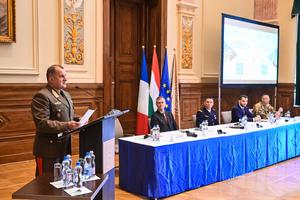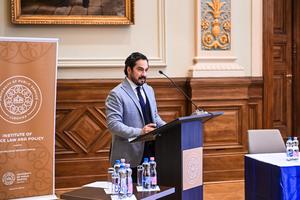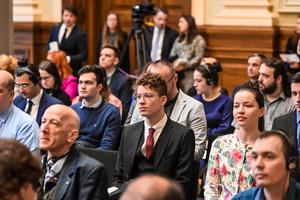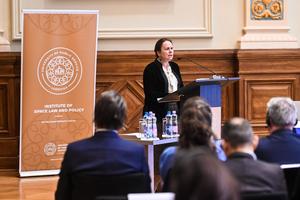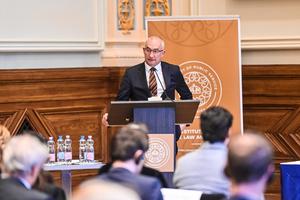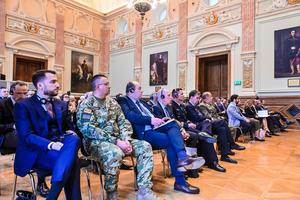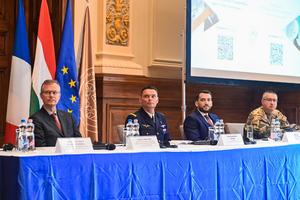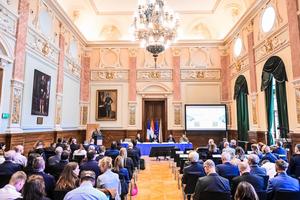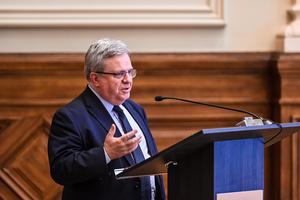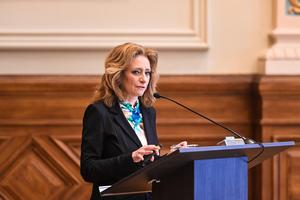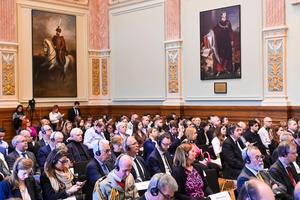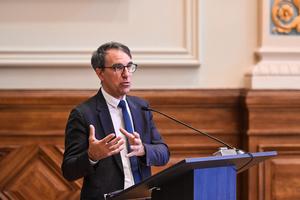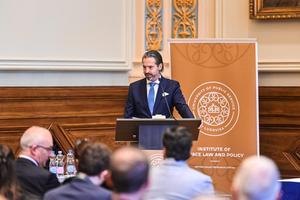The Eötvös József Research Center's (EJKK) Institute of Space Law and Politics (VPKI) organised a conference titled "Space Policy: Strategic and European Issues. French-Hungarian Perspectives" on March 27th in the Széchenyi Hall of the Ludovika University of Public Service (LUPS). The speakers sought to address the defence challenges facing this field, how European countries can effectively collaborate, and what space-related educational programs exist in Hungary and France.
Pier Paolo Pigozzi, vice-rector for international affairs of LUPS, stated in his opening speech that new technologies provide an opportunity to exploit the infinite possibilities of outer space. However, he emphasised that such opportunities also entail numerous national security risks. He pointed out that Ludovika launched its Institute of Space Law and Politics in 2012, which is in contact with the European Space Agency.
Claire Legras, the Ambassador of France to Hungary, emphasised that space policy cooperation between Hungary and France is continuously evolving, encompassing economic and defence issues, as well as telecommunications, navigation, and natural science research. She added that the private sector is now represented in addition to the public sector in this field, underscoring the importance of practical inter-country cooperation.
"The French and Hungarian space perspectives are very promising," highlighted Péter Sztáray, State Secretary for Security Policy and Energy Security at the Ministry of Foreign Affairs and Trade (KKM). He noted that Hungary has increasingly emphasised space activities in recent years, including establishing the space policy department within the KKM. He added that it is in the common interest of France and Hungary to collaborate in international organisations, which helps to establish security and transatlantic space strategy.
Hervé Derrey, President and CEO of Thalės Alenia Space, presented his company at the conference, which operates in seventeen countries and has over forty years of experience. Their main activities include telecommunications, navigation, and playing an essential role in intelligence and military data collection. The company signed a strategic agreement with the KKM in 2021.
During his presentation, Xavier Pasco, Director of the French Foundation for Strategic Research, discussed the space environment in 2024. He emphasised that space activities are changing rapidly due to digitalisation. He believes the question is how to utilise these new competencies and make the space environment safer.
Orsolya Ferencz, Ministerial Commissioner for Space Research at the KKM, discussed Hungary's space strategy, focusing primarily on industrial capacity and developing educational and diplomatic areas. She mentioned that Hungary has signed over 20 bilateral agreements so far.
The speakers shared their views on military challenges in the first part of the panel discussions following the introductory presentations. Colonel Sylvain Debarre, Director of the NATO Toulouse Space Centre of Excellence, reminded us that in 2019, NATO stated that military activity in space could trigger Article 5, considering space as a military operational domain. He pointed out the emerging threat towards space from Earth, stressing the importance of knowing precisely what is happening in space.
Laurent Martinet, Deputy Director-General of Legal Affairs at the French Ministry of Defense, discussed the 2008 French Space Act, stating that effective control has not yet been established in that legislation, which would apply to the territory's technical and administrative aspects. He emphasised the need to control space activities.
István Sárhegyi, Acting CEO of 4iG Space & Technology Zrt., detailed his company, which employs eight thousand workers and operates in information technology, telecommunications, and the space and defence industries. He also mentioned their involvement in the drone sector, where they aim to play a leading role.
Attila Horváth, Lieutenant Colonel and Head of the Satellite Operations Capability Division of the Hungarian Defense Forces discussed how to prove the intentions, harmful or benign, of the interaction between two satellites in space, which raises further questions.
The second panel discussion focused on European cooperation. According to Senator Jean-Francois Rapin from the Pas-de-Calais region, new situations emerge in the space race due to trade ambitions, weakening Europe's role. He sees space control as a question of sovereignty, stating, "Whoever controls space controls sovereignty."
Szabolcs Szolnoki, Deputy State Secretary for Technology at the Ministry for National Economy, spoke about Hungary's first space strategy completed in 2021 and how the ministry became involved this year, primarily in industrial development.
Bernard Luciani, Deputy Director of European and International Affairs at the French Space Agency (CNES), said France has never seen such significant space policy development as it does now. He believes it is essential to open this industry to the private sector.
Balázs Bartóki-Gönczy, Director of VPKI, discussed the problem of European autonomy capabilities and the underfunding of the space sector in Europe. However, promising steps are being taken, such as developing the navigation satellite system.
Mathieu Bataille, Researcher and Head of Security and Defense Policy at the European Space Policy Institute, believes there is a need to improve the defence of European Union space systems and respond to threats from space. He emphasised that these topics will be necessary during Hungary's EU presidency starting this summer.
Regarding professional training in the sector, Bianka Horváth, Program Director of UniSpace, mentioned that the consortium of 17 universities started collaboration with the KKM in 2019. She highlighted that this is not a standard university education but is more economically oriented.
László Csurgai-Horváth, Associate Professor at the Budapest University of Technology and Economics (BME), discussed the space heritage, recalling their participation in many space-related projects over the decades, such as the Halley's Comet and the Rosetta missions. He highlighted their master's program in space engineering and their training for space technology experts.
Philippe Achilleas, Professor of Law at the Paris-Saclay University, discussed space law, and Emmanuel Zenou, Director of International Relations at the ISAE-SUPAREO French Aerospace Engineering School, talked about their institution's focus on defence and aviation, training high-level engineers to ensure France's independence and prosperity in Europe.
Text by Éva Harangozó
Photo by Dénes Szilágyi
